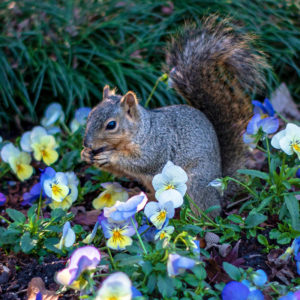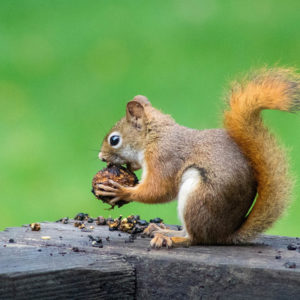
Gardening is all fun and games until the critters come to play. Slugs chew holes in your hosta leaves. The squirrels dig up your crocus. Those once “adorable” bunnies chomp your tulips. Alvin and his chipmunk friends go full lumberjack on your lilies that are just about to bloom. All your hard work only to be ruined by these common garden pests.
Don’t let critters discourage you from planting bulbs and perennials in your garden. There are things you can do to curtail the damage caused by some common garden pests. The main critters in my yard are squirrels, slugs, and the occasional chipmunk. I have some methods I have used to deter these critters but know that voles, moles, deer, and other pests can plague your gardens. Therefore, I did a little research in some online gardening forums on Houzz and Facebook to see what other gardeners do when faced with these common garden pests. I also spoke with a couple of garden experts who are local to me to come up with some solutions or methods to try to deter these pests from ruining your plants.
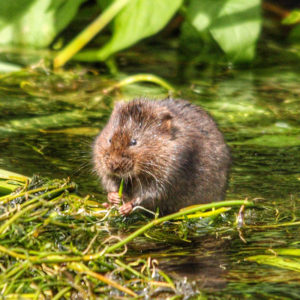
Voles in the Garden, Lawn and Planting Beds:
Voles are similar to the more commonly known moles in that they tunnel under the ground, voles are similar in appearance to a field mouse. Moles have a pointed snout and large hands and feet.
Voles create tunnels underground in your planting beds as well as your lawn. They don’t really sleep or stop producing and can be quite bothersome pests.
Garden community-based tips to combat voles in your yard:
- Get an outdoor cat to combat the voles
- Get a dog such as a rat terrier, Jack Russell terrier or terrier breed of dog that are known to hunt rats, mice, and voles
- Mousetraps
- Build a trap with PVC pipe buried underground, with bait to lure the voles
- Smoke bombs into the entry holes of their tunnels
- Castor oil placed outside of their tunnels as a repellent
- Adding mothballs to the planting holes of your flower bulbs such as crocus and tulips
- Plant your bulbs at least 9” deep, this tends to be lower than where the voles are making tunnels
- Plant bulbs like daffodils that are toxic to voles and squirrels by your vulnerable bulbs and perennials
- Using metal hardware cloth as a protective cage
Squirrels in the Garden and Planting Beds:
I enjoy watching the squirrels chase each other around the trees in my front yard. My dog Iorek enjoys watching the squirrels outside the large window in our living room; it is a live-action sporting event for him. However, I don’t enjoy the squirrels digging up all the crocus bulbs I planted. These furry critters can drive a gardener mad with their digging and harvesting.
There are some things I have done to counter the squirrel’s plans of garden theft. One thing I try to do is plant my fall-planted bulbs like tulips and crocus late in fall, almost as late as possible before the ground is frozen. I have found that late planting helps as it gives the squirrels a smaller window of time to dig up the bulbs when the ground is frozen; they are not easily able to get to the bulbs.
Planting my tulips and crocus deeper than the suggested depths on the package. For tulips, I plant them at least 9-10” deep, and for the crocus, I plant them at least 4” deep. This does not always work, depending on when they are planted, however, it does not harm the bulbs and works some of the time.
I have also dipped my squirrel vulnerable bulbs in repellents such as hot pepper spray or Liquid Fence prior to planting.
Garden community-based tips to combat squirrels in your yard:
- Hardware cloth or chicken wire over the area you planted the bulbs or perennials can help prevent the squirrels from digging into the soil. You will need to remove the hardware cloth or chicken wire in spring as soon as the foliage from the bulbs and perennials start emerging.
- Create a wire basket to contain the bulbs underground. Use chicken wire or hardware cloth to enclose the bulbs. You will want to make a removable top for the basket that you can easily remove in spring when the bulbs start to emerge. This wire basket will be helpful to deter squirrels, chipmunks, and voles.
- Indoor/outdoor cat
- Spices like cinnamon and cayenne pepper around the planting area can help deter squirrels from digging up the bulbs
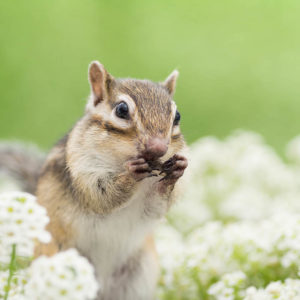
Chipmunks in your Garden
I don’t have a lot of sun in my yard, but one of the small areas I do have some sun I attempted to plant Oriental Lilies. They were growing well and ready to bloom, I was excited about the flowers. Little did I know that the chipmunks had other plans. They chomped the lily stems at the base, like little lumberjacks. I haven’t grown lilies in that spot since the “lumberchip” incident of 2012. However, I don’t want chipmunks to deter what I can plant. Therefore, a little research on how to protect your perennials and bulbs, as well as potted plants from chipmunks was in order.
Garden community-based tips to combat chipmunks in your yard:
- For newly sprouted plants cover the plants with wire cages.
- Use Blood Meal around the plants, re-apply when it rains.
- Place rocks among the flowers to deter them
- Add coffee grounds to the soil in your planters
- Pieces of Irish Spring soap around your plants can deter them.
- Sprinkle cayenne pepper on the soil
- Dog hair around the pots
- Add pinecones to the top of the soil
- Bamboo skewers placed in the soil in your pots will help deter the chipmunks from digging.
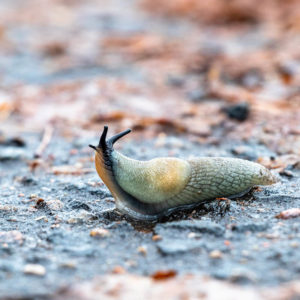
Slugs in the Garden
Since I have a lot of shaded areas in my yard, I have several varieties of hosta planted. Some varieties of hosta are more resistant to slug attacks than others. However, slugs can still be a problem on not only hosta but other plants as well.
To protect the hosta in my yard I like to trap the slugs with beer. I take an old tuna can and fill it with beer and place the tuna can in the garden. The slugs aren’t picky on the type of beer, any type will do. Slugs are attracted to the beer they will climb or fall into the container and drown. If you don’t want to have cans of beer in your garden for the slugs here are a few other suggestions from fellow gardeners
Garden community-based tips to combat slugs in your yard:
- Crush eggshells up finely and place around the base of the plants the slugs are eating. Eggshells are rich in calcium so when they break down will add nutrients to the soil. The slugs will try to traverse the eggshells but will not be able to due to the sharp edges of the shells.
- Epsom salt is a common household product that many gardeners use to fertilize their plants. Epsom salt deters slugs in the garden by drying them out.
- Hand-picking the slugs out of your garden if you have extra time or kids who like playing in the dirt and don’t mind slimy slugs.
- If you are fortunate to have enough room for chickens or ducks on your property, they find slugs to be quite delicious.
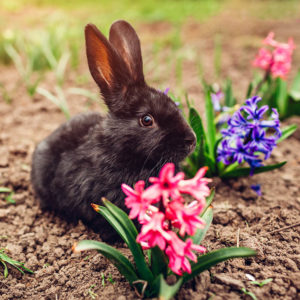
Rabbits in the Garden
Bunnies are adorable forest-dwelling creatures until they terrorize your garden. To the person who planted tulips last fall and had all the leaves chomped by bunnies, they aren’t so cute. Rabbits will also chew the stems of woody shrubs. They can take a beautiful nearly mature 6’ shrub down to within inches of the ground. Bunnies are common garden pests, but there are some things that can be done to deter them from ruining all of your hard work. Using a repellent like Liquid Fence on and around your vulnerable plants is a safe and effective way to deter the bunnies from eating your plants. Repellents should be re-applied frequently and always re-applied after it rains.
Garden community-based tips to combat bunnies in your yard:
- Install a small 2′ fence to keep the bunnies out of your planting areas
- Use chicken wire or metal hardware cloth around your most vulnerable plants
- Plant bulbs and perennials that bunnies don’t like near the vulnerable plants that bunnies like. Good choices for plants bunnies don’t like daffodils, allium, catmint, salvia, and fritillaria
- Use fake animals like fake owls or metal cats to scare the bunnies away
- Plant marigolds around the perimeter of your vegetable garden, as bunnies tend to dislike marigolds
- Get a dog to scare them away
Garden Expert Tips for Critter Control
There are many ways to control or deter these common garden pests in your yard and garden. Some methods are more effective than others. Some things you try work for a period of time but then fail later. It is important to switch your methods of how you deter these common garden pests. Get input from other gardeners on what tricks they have tried to increase your knowledge of how to repel these critters. I reached out to two local garden enthusiasts in my area and asked them to share some tips:
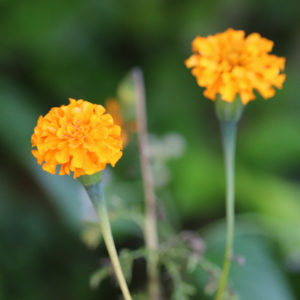
Plant Marigolds To Repel Rabbits
Katie S- Horticultuarlist at Holland Bulb Farms
- Spraying hot pepper spray around the plants
- Sprinkling hot pepper flakes around the base of plants
- Soap strung up around the garden
- Planting marigolds or plants that animals don’t like around the plants
- Aluminum pie trays hung up near the garden
- Offer another food source away from the garden such as birdseed
- I know for repelling deer, mixing milk and dish soap and spraying it on leaves works too.

Paint Stones Red To Discourage Birds From Feasting on Tomatoes
Sandra S- Garden Enthusiast and Canning Expert
Sandra has an extensive garden in South Eastern Wisconsin. She focuses on growing vegetables for eating at homes as well as canning. Sandra said “To protect your tomatoes and strawberries from birds that poke holes in the fruit you can paint garden stones red. Place the painted stones near the plants. For strawberries choose stones that are similar in size to the berries. Tomatoes you will want to use larger stones that are similar in size to the tomatoes. By painting the stones the same color as the fruit it distracts the birds from poking holes in the fruit.” For garden fresh recipes, planting techniques and more, join Sandra’s facebook page.

The Vast World of Common Garden Pests and Critters
Nature is full of bugs, critters, mammals, and fungi that may cause damage to your plants. It is also full of plenty of harmless and beneficial bugs, critters, mammals, and fungi. Some gardeners deal with a variety of garden pests, while others may have only one specific garden pest they have to worry about. The best thing to do is to keep trying to grow a variety of plants in your yard and keep trying different methods to protect your plants. Talk to your neighbors and the garden community to see what works for them, but don’t give up on growing your favorite, bulbs, perennials, fruits, vegetables, trees, and shrubs.
What About the Deer?!
Yes, you may have noticed that I didn’t mention deer in this post about garden critters and pests. Deer are a problem for gardeners all over the United States. There are ways you can deter deer, and plants that deer don’t like. On the Bulb Blog, there are a few articles related to deer in the garden. If deer are a problem for you I hope you find these resources helpful.


